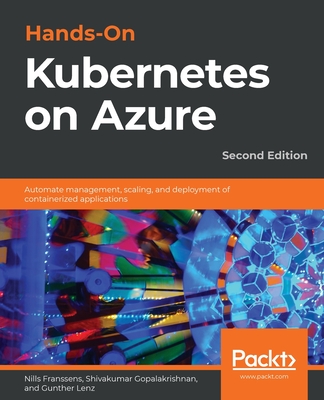Azure Kubernetes Services with Microservices: Understanding Its Patterns and Architecture
暫譯: Azure Kubernetes 服務與微服務:理解其模式與架構
Ahmed Shaikh, Kasam, Agaskar, Shailesh S.
- 出版商: Apress
- 出版日期: 2021-12-12
- 售價: $2,570
- 貴賓價: 9.5 折 $2,442
- 語言: 英文
- 頁數: 264
- 裝訂: Quality Paper - also called trade paper
- ISBN: 1484278089
- ISBN-13: 9781484278086
-
相關分類:
Kubernetes、Microservices 微服務、SOA、Microsoft Azure
海外代購書籍(需單獨結帳)
相關主題
商品描述
Chapter Goal: This Chapter will present an overview of Microservices and AKS. This will detail down the What, Why, When for using this Architecture and Service. How they are related to each other and merits on coupling these two entities.
No of pages 30 -40
Sub -Topics
1. Introduction to Microservices
2. Monolith vs Microservices
3. Introduction to Cloud Native
4. How does Business benefit from Cloud Native Applications.
5. Introduction to AKS and its components
Chapter 2: Architecture & Designing ConsiderationChapter Goal: This chapter will involve points to be considered while Architectural & designing Microservices with AKS based applications. Must consideration checklist, and points to be remembered while brainstorming on making designing decisions.
No of pages: 30 - 40
Sub - Topics
1. Introduction to Microservices design patterns
2. Design patterns to implement Microservices on AKS3. What are Containers
4. Kubernetes as a container orchestration platform
5. Sample application to drive the design best practices of Microservices and AKS
Chapter 3: Dealing with common failuresChapter Goal: This Chapter will help in detailing common errors faced in AKS based applications and ways to handle the same. This will cover the error handling tips & tricks.
No of pages: 30 - 40
Sub - Topics:
1. Failure scenarios and how to handle them e.g. Handling node failures
2. Common failures and building resiliency in Microservices using AKS and other Azure Services.
3. high availability and deployment scenarios to ensure always available microservices using Azure services.
4. How to design for business continuity and disaster recoveryChapter 4: Securing your AKS Workloads
Chapter Goal: This Chapter deals with setting up and configuring AKS workloads with Security aspects. Steps to keep the AKS application secure.
No of pages: 30 - 40
Sub - Topics:
1. Security best practices for microservices and how to leverage AKS
2. Role based access control in AKS and how to design .
3. Azure Active Directory pod- managed identities
3. Leverage of Azure Key Vaults and Network Security in AKS
4. Azure Security Center leverage for AKS
Chapter 5: Monitoring AKS based Application
Chapter Goal: This Chapter will detail all required commands used for debugging and Monitoring ASK based applications. Configuring Metrics and Diagnostics for AKS.No of pages: 30 - 40
Sub - Topics:
1. Monitoring AKS cluster and microservices
2. Ready and Alive probes and how to implement them
3. Health and Diagnostics Metric for the Microservices and AKS
4. Pod Consumption metrics and thresholds management
Chapter 6: CI/CD for AKS
Chapter Goal: This chapter will present with Setup process for CI/CD, like building Build, release pipelines for AKS deployment using Azure and GitHub.
No of pages: 30 - 40
Sub - Topics:
1. Azure DevOps setup Microservices deployment
商品描述(中文翻譯)
第 1 章:與微服務及 AKS 的快速握手
章節目標:本章將介紹微服務和 AKS 的概述。將詳細說明使用此架構和服務的原因、時機及其關聯性,以及將這兩個實體結合的優點。
頁數:30 - 40
子主題:
1. 微服務介紹
2. 單體架構 vs 微服務
3. 雲原生介紹
4. 企業如何從雲原生應用中受益
5. AKS 及其組件介紹
第 2 章:架構 與設計考量章節目標:本章將涉及在基於 AKS 的應用中設計微服務時需要考慮的要點。必須考慮的檢查清單,以及在進行設計決策時需要記住的要點。
頁數:30 - 40
子主題:
1. 微服務設計模式介紹
2. 在 AKS 上實現微服務的設計模式
3. 什麼是容器
4. Kubernetes 作為容器編排平台
5. 驅動微服務和 AKS 設計最佳實踐的示例應用
第 3 章:處理常見故障章節目標:本章將詳細說明在基於 AKS 的應用中遇到的常見錯誤及其處理方法。將涵蓋錯誤處理的技巧與竅門。
頁數:30 - 40
子主題:
1. 故障場景及其處理方法,例如處理節點故障
2. 常見故障及在微服務中使用 AKS 和其他 Azure 服務建立韌性
3. 高可用性和部署場景,以確保使用 Azure 服務的微服務始終可用
4. 如何設計業務連續性和災難恢復
第 4 章:保護您的 AKS 工作負載章節目標:本章將處理設置和配置 AKS 工作負載的安全性方面。保持 AKS 應用安全的步驟。
頁數:30 - 40
子主題:
1. 微服務的安全最佳實踐及如何利用 AKS
2. AKS 中的基於角色的訪問控制及其設計方法
3. Azure Active Directory pod-管理的身份
4. 在 AKS 中利用 Azure Key Vault 和網絡安全
5. 利用 Azure Security Center 來增強 AKS 的安全性
第 5 章:監控基於 AKS 的應用
章節目標:本章將詳細介紹用於調試和監控基於 AKS 的應用所需的所有命令。配置 AKS 的指標和診斷。
頁數:30 - 40
子主題:
1. 監控 AKS 集群和微服務
2. Ready 和 Alive 探針及其實現方法
3. 微服務和 AKS 的健康狀況及診斷指標
4. Pod 消耗指標和閾值管理
第 6 章:AKS 的 CI/CD
章節目標:本章將介紹 CI/CD 的設置過程,例如使用 Azure 和 GitHub 為 AKS 部署構建構建和發布管道。
頁數:30 - 40
子主題:
1. Azure DevOps 設置微服務部署















